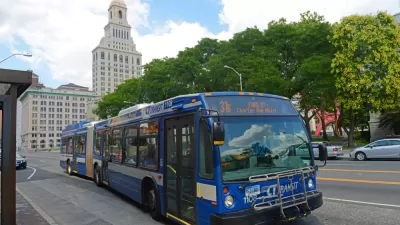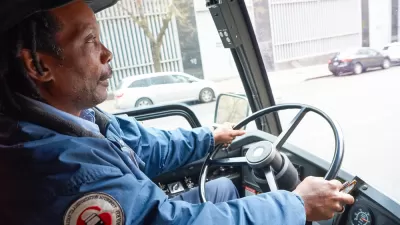The Los Angeles County Metropolitan Transportation Authority Board of Directors has approved a program that would eliminate fares for students and low-income riders, but the program's future rests on finding sustainable funding sources.

The board of the Los Angeles County Metropolitan Transportation Authority (Metro) has tentatively approved "a 23-month fareless transit pilot program" for K-12 and community college students—provided that the agency can prove they can cover the cost, among other conditions. "Right now, no launch date has been set, though the staff proposal sought to start with the student groups this August, then expand in January 2022 to include 'qualifying low-income residents,'" reports Ryan Fonseca in LAist.
A Metro task force has been studying the issue since September. The agency's CEO Phil Washington, "who is stepping down from his role this month, pitched exploring free transit as a moral obligation of the agency. Eliminating fares is also seen as a way to improve transit service by reducing boarding time, and encourage more people to take the system regularly by removing a financial barrier." While rider fares make up around 13% of Metro's operating costs, "roughly one-third of those costs go toward expenses related to fare collection, such as fare enforcement, accounting and fare box maintenance." Fareless transit would also address "equity concerns about Black and brown riders being targeted for fare evasion, leading to confrontations with law enforcement and deaths on the system."
With 70 percent of Metro riders qualifying as low-income, eliminating fares would be "a major step toward making the county’s bus and rail system free for all riders." But the agency must still contend with the cost of a permanent program. "In its report to the board, staff noted that 'a sustainable source of additional funding' will need to be secured for fareless transit to remain viable."
FULL STORY: LA Metro Moves Forward With Plan To Explore Free Transit System

Trump Administration Could Effectively End Housing Voucher Program
Federal officials are eyeing major cuts to the Section 8 program that helps millions of low-income households pay rent.

Planetizen Federal Action Tracker
A weekly monitor of how Trump’s orders and actions are impacting planners and planning in America.

Ken Jennings Launches Transit Web Series
The Jeopardy champ wants you to ride public transit.

Opinion: Transit Agencies Must View Service Cuts as Last Resort
Reducing service could cripple transit systems by pushing more riders to consider car ownership, making future recovery even less certain.

‘Smart Surfaces’ Policy Guide Offers Advice for Building and Maintaining Urban Tree Canopies
Healthy, robust tree canopies can reduce the impacts of extreme heat and improve air quality.

New Jersey Lawsuit Targets Rent-Setting Algorithms
The state of New Jersey is taking legal action against landlords and companies that engage in what the state’s Attorney General alleges is illegal rent fixing.
Urban Design for Planners 1: Software Tools
This six-course series explores essential urban design concepts using open source software and equips planners with the tools they need to participate fully in the urban design process.
Planning for Universal Design
Learn the tools for implementing Universal Design in planning regulations.
Heyer Gruel & Associates PA
Ada County Highway District
Institute for Housing and Urban Development Studies (IHS)
City of Grandview
Harvard GSD Executive Education
Toledo-Lucas County Plan Commissions
Salt Lake City
NYU Wagner Graduate School of Public Service





























